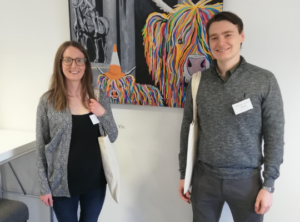The annual Scottish Cancer Conference was held in Glasgow on 18 November 2019. It was a unique gathering of organisations involved with cancer, including patients, pharmaceutical companies, clinicians and charities. It presented an opportunity to share, learn and network, as well as understand the latest developments in Scotland’s combined efforts to beat cancer.

This year the meeting focused on the outcomes of the National Cancer Diagnosis Audit and associated strategies to ensure patients across Scotland get access to new treatments.
Amy Capper and Daniel Cairns from the Patient Advocacy and Policy team share their conference highlights:
Amy said:
“My highlight was the analysis of the National Cancer Diagnosis Audit. The project was carried out to improve the understanding of patient pathways to cancer diagnosis in Scotland. It collected data from over 2,000 patients diagnosed with cancer in 2014 which was analysed to identify any significant differences in patient presentation, the route to diagnosis, primary care and diagnostic intervals, and to highlight avoidable delays. The results showed that 6% of all cancers were diagnosed by a screening programme, one in five by emergency presentation, but the majority by urgent GP referral. Of these urgent GP referrals, one in ten resulted in a myeloma diagnosis. Avoidable delays, which GPs reported at any point in the diagnostic pathway, were found in almost a third of all cases in the audit.
The analysis highlighted the value of real-world data on capturing delays in diagnosis and the potential for changes to current practice that could be made to improve patient outcomes. In myeloma, we know that emergency presentation is associated with advanced disease and significantly worse survival. At Myeloma UK, we are working towards developing solutions to diagnosis challenges in myeloma as we believe that myeloma patients have the same right to a timely diagnosis as patients with any other cancer.”
Daniel said:
“Two sessions stood out for me. One focused on access to new treatments across Scotland and the other on health service improvements. The first session was a panel discussion focused on the current landscape and the challenge to deliver access whilst managing uncertainty in clinical trial data and ensuring value for money. The speakers showed that since the reforms were made in 2016, approval for new cancer treatments at SMC has increased from 60% in 2015 to 85% in 2018. Furthermore, 87% of these approvals were informed by Patient and Clinician Engagement meetings which give a stronger voice to patients in the SMC decision-making process. The panel discussed future challenges to access including approvals for high-cost combination treatments and new technologies which will challenge the cost-effectiveness threshold set by the SMC.
The panel also emphasised the need to incorporate different types of data, suggesting that Scotland has a fantastic potential for the pioneering use of data and real-world evidence to inform decision making. NHS data tools such e-prescribing can be combined with patient-reported outcome measures (PROMs) to monitor patient outcomes and potentially move Scotland towards an outcomes-based payment system.
My second highlight was the launch of the Inquiry Report on Priorities for the Future of Cancer Services from the Cross Party Group (CPG) on Cancer. The report follows a pause in the current Cancer Strategy and aims to identify those priorities that the CPG recommends the Scottish Government consider implementing to improve cancer services. The findings of the report focused on workforce planning, unlocking the potential benefits of data and real-world evidence to enable data-led planning of cancer services, and the development of holistic cancer support services across Scotland.
These sessions reconfirmed the current and future challenges to cancer care in Scotland. They emphasised the need for patient-focused, data-led planning through the generation of new patient data and real-world evidence, which is a key focus for Myeloma UK. It is clear that access to new treatments and an informed, evidence led Cancer Strategy will be vital to improving patient outcomes in Scotland.”
